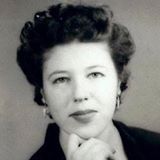Sydell Gasnick-Rosenberg

Sydell Gasnick-Rosenberg (1929-1996) of Queens, NY was a charter member of the Haiku Society of America, attending the founding meeting in 1968. She had previously published in American Haiku—the first North American haiku magazine—as well as in Haiku West and Canada's Haiku. Syd served on two Merit Book Award committees and was Secretary of HSA in 1975. She also was anthologized in Frogpond, Wind Chimes, Modern Haiku, Haiku West and numerous other publications. Her work was featured in several important haiku texts, including: The Haiku Anthology, by Cor van den Heuvel; and The Haiku Handbook, by William J. Higginson and Penny Harter. In addition, her senryu, “In the Laundermat,” was highlighted in the public art project, “Haiku On 42nd Street” in 1994, in which the marquees of dilapidated, shuttered movie theaters were transformed into showcases for short poems. Much of her work reflected an urban sensibility; in Mr. van den Heuvel’s anthology, first published in 1974, she had referred to her short poems as “city haiku.” Her work was mostly traditional in style, although she also experimented with the form over the years.
Syd attended Brooklyn College and received her Master’s Degree in English as a Second Language from Hunter College in the early 1970s. She became a teacher in NY. In addition to her approximately 30 year career as a haijin, she also published other poetry, as well as inventive literary and lexical puzzles and prose - especially short stories – and translated literature from and into Spanish. Syd also published a pulp novel, Strange Circle – apparently on a dare from her publisher boss -- as a young woman in the 1950s, under the male pseudonym, Gale Sydney (a reversal of her maiden name initials, Sydell Gasnick).
Syd died suddenly on October 11, 1996 of an aortic aneurysm. This unexpected loss was a shock to her loved ones. In recent years, her daughter, Amy Losak, has made it her mission to revive some of Syd’s best work and bring it to today’s audiences -- especially children – via a variety of educationally enriching initiatives.
For example, in recent years, Amy has sponsored teaching artists’ residencies from the NY non-profit arts education organization, Arts for All (arts-for-all.org) Teachers have used Syd’s haiku as creative prompts and tools in their art, music, and drama programs in two schools in the Bronx and Queens.
Most importantly, in 2018, Amy traditionally published Sydell’s H Is For Haiku (Penny Candy Books; illustrated by Sawsan Chalabi). An alphabet picture book had been Syd’s dream for decades. This collection features her introduction to haiku, first published in Wind Chimes in 1981 (it also is posted on Michael Dylan Welch’s site, Graceguts), and several previously published poems. It also includes a new introduction by Amy.
H Is For Haiku has been warmly received by parents and children, teachers, and librarians. The National Council for Teachers of English honoured it as a 2019 “Notable Poetry Book.” It is widely available, including on pennycandybooks.com, bookshop.org/shop/
In an interview for The Haiku Society of America, Amy described Sydell’s style very well: “Her haiku and senryu are compact and concise—and yet highly evocative—visual ‘snapshots’ of moments in time in nature, urban life and relationships; many of these short pictorial poems are perfect for children who are learning to engage with and interpret the world around them in creative ways".
Sydell was married to Sam Rosenberg (d. 2003) for approximately 41 years. Amy is a healthcare public relations consultant. Their son, Nathan Rosenberg, is an insurance agent and financial advisor in Florida. They also have two adult grandchildren, Zachary and Julia. Amy is now editing Sydell’s poetry book for adults, and a second poetry picture book that combines both their work.
Selected haiku and senryu:
Like a giant cat
rain licked away the hopscotch
chalked in the bright sun.
(Haiku West, 1967)
Adventures over
the cat sits in the fur ring
of his tail, and dreams.
(SCTH, 1967)
Holding umbrellas
children, like rows of mushrooms
glisten in the rain.
(American Haiku, 1967)
So pale -– it hardly sat
on the outstretched branch
of the winter night.
(Haiku West, ”best original, previously unpublished subscriber-haiku,” 1968; HW, 1975; “In Memory of Sydell Rosenberg,” Frogpond, 1996)
In a quiet cove
ducks abandon their formation
swimming after bread.
(American Haiku, 1968)
A wrapping of snow –
here and there in the ivy
a dark leaf showing.
(American Haiku, 1967; Haiku West, 1970)
My purchase of fish
wears yesterday’s grim headline
for undergarments.
(Modern Haiku, 1970)
At the ballet
pushed into a corner
a wheelchair
(Modern Haiku, 1973)
Hazy summer day
only yellow school buses
and white butterflies
(Wind Chimes, 1982)
Autumn rain
fragrant in the brown paper
of my groceries
(Wind Chimes, 1982)
Opening one eye
the bag lady sneers into
the tourist’s camera.
(Frogpond, 1986)
breaking the fast
with pizza and soda
on Yom Kippur
(Haiku World, 1996)
Chartreuse Mood
Still there
chartreuse tennis ball
on the fire escape
Soaking up moonlight
on the fire escape
chartreuse tennis ball
On the fire escape
chartreuse tennis ball
not there
(Poetry Society Of Virginia, “J. Franklin Dew Award” Second Prize Winner for a “Series of three or four haiku on a single theme,” 1990; “Soaking up moonlight,” Hummingbird, 1993)
Boy Montage
Picking up a stick
the little boy is master
of the country road.
Declaring a truce
he slurps from his water gun
to cool himself.
Running to the bus
bathing soup wrapped in a towel
jelly-roll style.
Speeding past his friends
dry leaves clinging to sweater --
boy on bicycle.
Intrigued too long
little boy staring at shell
of capsized turtle.
(Sequence published in Modern Haiku, 1970; “Declaring a truce,” Tinywords, 2014)
Additional sources:
- https://www.nyjournalofbooks.
com/book-review/h-haiku - http://www.hsa-haiku.org/
frogpond/2018-issue41-3/ Rosenberg-HforHaiku-Fp41-3.pdf - https://haikucommentary.
wordpress.com/2017/08/21/ sydell-rosenbergs-feather/ - http://teaneck.dailyvoice.com/
neighbors/teaneck-woman- plants-tree-of-love-honoring- her-mom/668725/ - http://www.arts-for-all.org/
archives/2379 - http://www.haigaonline.com/
issue16-1/issue.html - https://tinywords.com/?s=
Rosenberg - http://www.hsa-haiku.org/
haikucolumn-archives/26-haiku- column-7-14-2014.htm - http://www.takepart.com/
article/2014/04/16/why-its- important-teach-poetry-schools
